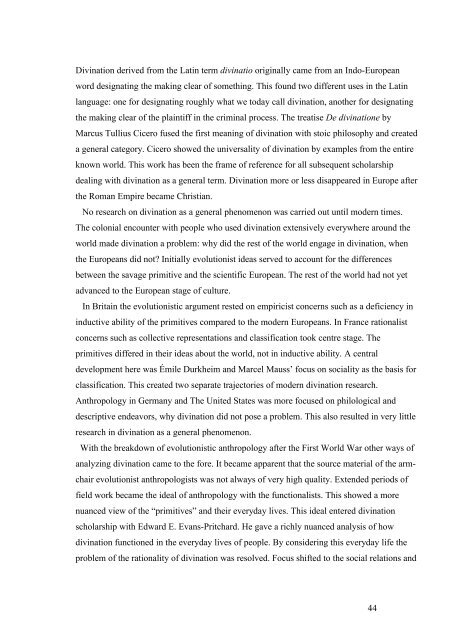The dissemination of divination in roman republican times
The dissemination of divination in roman republican times
The dissemination of divination in roman republican times
You also want an ePaper? Increase the reach of your titles
YUMPU automatically turns print PDFs into web optimized ePapers that Google loves.
Div<strong>in</strong>ation derived from the Lat<strong>in</strong> term div<strong>in</strong>atio orig<strong>in</strong>ally came from an Indo-European<br />
word designat<strong>in</strong>g the mak<strong>in</strong>g clear <strong>of</strong> someth<strong>in</strong>g. This found two different uses <strong>in</strong> the Lat<strong>in</strong><br />
language: one for designat<strong>in</strong>g roughly what we today call <strong>div<strong>in</strong>ation</strong>, another for designat<strong>in</strong>g<br />
the mak<strong>in</strong>g clear <strong>of</strong> the pla<strong>in</strong>tiff <strong>in</strong> the crim<strong>in</strong>al process. <strong>The</strong> treatise De <strong>div<strong>in</strong>ation</strong>e by<br />
Marcus Tullius Cicero fused the first mean<strong>in</strong>g <strong>of</strong> <strong>div<strong>in</strong>ation</strong> with stoic philosophy and created<br />
a general category. Cicero showed the universality <strong>of</strong> <strong>div<strong>in</strong>ation</strong> by examples from the entire<br />
known world. This work has been the frame <strong>of</strong> reference for all subsequent scholarship<br />
deal<strong>in</strong>g with <strong>div<strong>in</strong>ation</strong> as a general term. Div<strong>in</strong>ation more or less disappeared <strong>in</strong> Europe after<br />
the Roman Empire became Christian.<br />
No research on <strong>div<strong>in</strong>ation</strong> as a general phenomenon was carried out until modern <strong>times</strong>.<br />
<strong>The</strong> colonial encounter with people who used <strong>div<strong>in</strong>ation</strong> extensively everywhere around the<br />
world made <strong>div<strong>in</strong>ation</strong> a problem: why did the rest <strong>of</strong> the world engage <strong>in</strong> <strong>div<strong>in</strong>ation</strong>, when<br />
the Europeans did not? Initially evolutionist ideas served to account for the differences<br />
between the savage primitive and the scientific European. <strong>The</strong> rest <strong>of</strong> the world had not yet<br />
advanced to the European stage <strong>of</strong> culture.<br />
In Brita<strong>in</strong> the evolutionistic argument rested on empiricist concerns such as a deficiency <strong>in</strong><br />
<strong>in</strong>ductive ability <strong>of</strong> the primitives compared to the modern Europeans. In France rationalist<br />
concerns such as collective representations and classification took centre stage. <strong>The</strong><br />
primitives differed <strong>in</strong> their ideas about the world, not <strong>in</strong> <strong>in</strong>ductive ability. A central<br />
development here was Émile Durkheim and Marcel Mauss’ focus on sociality as the basis for<br />
classification. This created two separate trajectories <strong>of</strong> modern <strong>div<strong>in</strong>ation</strong> research.<br />
Anthropology <strong>in</strong> Germany and <strong>The</strong> United States was more focused on philological and<br />
descriptive endeavors, why <strong>div<strong>in</strong>ation</strong> did not pose a problem. This also resulted <strong>in</strong> very little<br />
research <strong>in</strong> <strong>div<strong>in</strong>ation</strong> as a general phenomenon.<br />
With the breakdown <strong>of</strong> evolutionistic anthropology after the First World War other ways <strong>of</strong><br />
analyz<strong>in</strong>g <strong>div<strong>in</strong>ation</strong> came to the fore. It became apparent that the source material <strong>of</strong> the arm-<br />
chair evolutionist anthropologists was not always <strong>of</strong> very high quality. Extended periods <strong>of</strong><br />
field work became the ideal <strong>of</strong> anthropology with the functionalists. This showed a more<br />
nuanced view <strong>of</strong> the “primitives” and their everyday lives. This ideal entered <strong>div<strong>in</strong>ation</strong><br />
scholarship with Edward E. Evans-Pritchard. He gave a richly nuanced analysis <strong>of</strong> how<br />
<strong>div<strong>in</strong>ation</strong> functioned <strong>in</strong> the everyday lives <strong>of</strong> people. By consider<strong>in</strong>g this everyday life the<br />
problem <strong>of</strong> the rationality <strong>of</strong> <strong>div<strong>in</strong>ation</strong> was resolved. Focus shifted to the social relations and<br />
44


